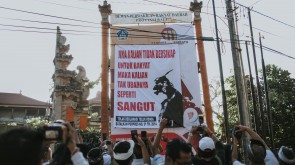Green groups have stepped up their efforts to stop the planned reclamation of Benoa Bay in Bali.
On Monday, the Indonesian Forum for the Environment (Walhi) and an alliance of Bali-based non-governmental organizations grouped under ForBALI sought support from the National Commission on Human Rights (Komnas HAM) and the Indonesian Ombudsman.
The group said the project would severely damage the ecosystem in the bay, given its designation as a conservation area, and that it would put the local fishing community out of work.
“It is clear that a conservation area is one that should be protected, yet the government and PT Tirta Wahana Bali International still insist on continuing with their plan, ignoring environmental concerns and the rights of local people living near the area,” Walhi food and water campaigner M. Islah said in Jakarta on the sidelines of a hearing with Komnas HAM and the Indonesian Ombudsman. PT Tirta Wahana Bali International is the primary investor in the reclamation project and reportedly has ties with one of the country’s most influential businessmen, Tomy Winata.
“They should stop the planned reclamation immediately or we will see the devastation of the environment and sociocultural malfunctions in the southern part of Bali,” Islah said. Benoa Bay is listed as a conservation area in the Denpasar spatial plan and in Presidential Regulation No. 45/2011.Presidential Regulation No. 122/2012 bans the reclamation of conservation areas. The reclamation plan was part of the Masterplan for the Acceleration and Expansion of Indonesian Economic Development (MP3EI). Benoa Bay is also a water catchment as well as the estuary of the island’s four major rivers.
A study conducted by Udayana University concluded that the development plan was not viable. ‘This means that legally and technically they cannot continue this project,” ForBALI coordinator Wayan Gendo Suardana said, referring to the study released in September last year.
Wayan claimed the company had ordered a new study to counter the findings by Udayana University. According to the second study, conducted by the Bandung Institute of Technology (ITB), the Bogor Institute of Agriculture (IPB), Gajah Mada University (UGM) and Hasanuddin University (Unhas), the project was viable.
Wayan said that supporters of the project only need look at the current condition of Serangan Island, which is 500 meters from Benoa Bay and underwent reclamation in 1994, to witness the destruction caused by such a project. “The turtles are gone, the coral reefs are damaged, the mangrove forest no longer exists and seaweed farmers have lost their jobs and are forced to work in the tourist industry. Clearly reclamation is not going to benefit anyone or anything here,” he continued.
Source: The Jakarta Post
Green groups have stepped up their efforts to stop the planned reclamation of Benoa Bay in Bali.
On Monday, the Indonesian Forum for the Environment (Walhi) and an alliance of Bali-based non-governmental organizations grouped under ForBALI sought support from the National Commission on Human Rights (Komnas HAM) and the Indonesian Ombudsman.
The group said the project would severely damage the ecosystem in the bay, given its designation as a conservation area, and that it would put the local fishing community out of work.
“It is clear that a conservation area is one that should be protected, yet the government and PT Tirta Wahana Bali International still insist on continuing with their plan, ignoring environmental concerns and the rights of local people living near the area,” Walhi food and water campaigner M. Islah said in Jakarta on the sidelines of a hearing with Komnas HAM and the Indonesian Ombudsman. PT Tirta Wahana Bali International is the primary investor in the reclamation project and reportedly has ties with one of the country’s most influential businessmen, Tomy Winata.
“They should stop the planned reclamation immediately or we will see the devastation of the environment and sociocultural malfunctions in the southern part of Bali,” Islah said. Benoa Bay is listed as a conservation area in the Denpasar spatial plan and in Presidential Regulation No. 45/2011.Presidential Regulation No. 122/2012 bans the reclamation of conservation areas. The reclamation plan was part of the Masterplan for the Acceleration and Expansion of Indonesian Economic Development (MP3EI). Benoa Bay is also a water catchment as well as the estuary of the island’s four major rivers.
A study conducted by Udayana University concluded that the development plan was not viable. ‘This means that legally and technically they cannot continue this project,” ForBALI coordinator Wayan Gendo Suardana said, referring to the study released in September last year.
Wayan claimed the company had ordered a new study to counter the findings by Udayana University. According to the second study, conducted by the Bandung Institute of Technology (ITB), the Bogor Institute of Agriculture (IPB), Gajah Mada University (UGM) and Hasanuddin University (Unhas), the project was viable.
Wayan said that supporters of the project only need look at the current condition of Serangan Island, which is 500 meters from Benoa Bay and underwent reclamation in 1994, to witness the destruction caused by such a project. “The turtles are gone, the coral reefs are damaged, the mangrove forest no longer exists and seaweed farmers have lost their jobs and are forced to work in the tourist industry. Clearly reclamation is not going to benefit anyone or anything here,” he continued.
Source: The Jakarta Post









